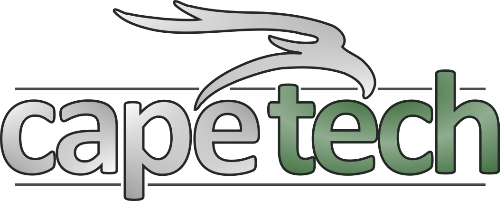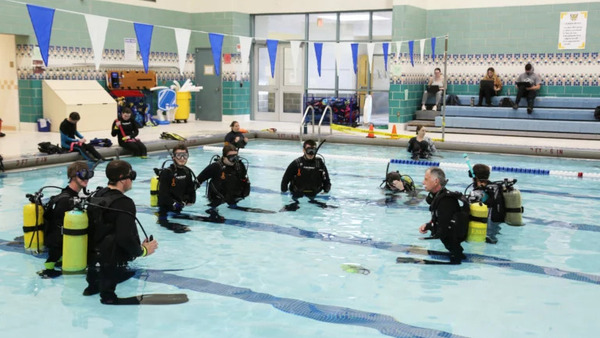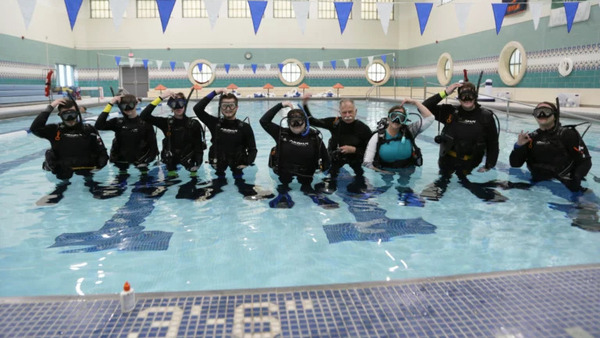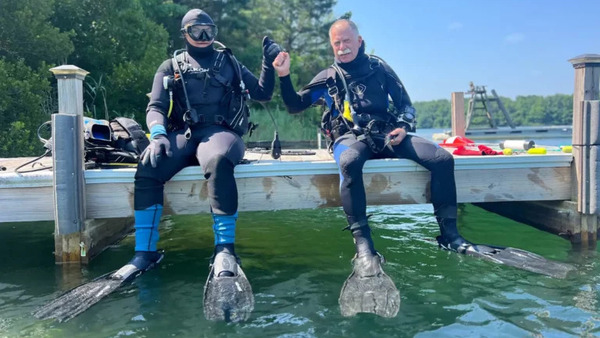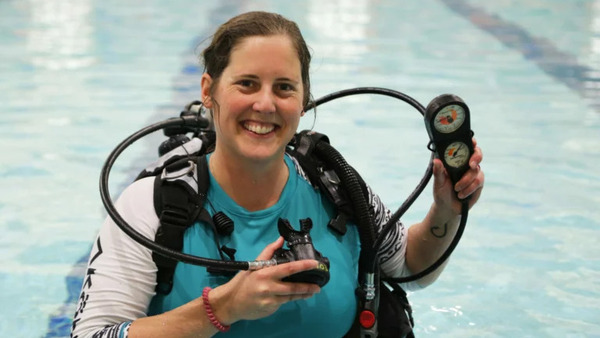Taking the plunge with scuba at Cape May Technical School District
By Kathryn Coulibaly
Not many students get to spend class in a pool, but for 15 seniors at Cape May County Technical School District (CMCTSD), this is just part of their natural sciences class. The students are taking part in a SCUBA class designed to teach them a variety of scientific skills, including how to plan a dive, prepare and monitor equipment, and how to overcome challenges.
As the students examine and prepare their equipment poolside, they are guided by their natural sciences teacher, Hanna Toft and Gene Peterson, a legend in the dive community.
Before the students can don their wetsuits and tanks, they must first show proficiency in swimming. Once students pass their swim tests, they can begin with a snorkel warmup. Working with a buddy, they have to demonstrate that they are mastering the skills in each section before moving on to dives in the deep end with Peterson.
Following in her father’s footsteps
For Toft, not only is teaching SCUBA a labor of love, so is teaching at CMCTSD. She follows in the footsteps of her father, Hans Toft, who taught the natural sciences program at CMCTSD for 41 years. Like her father, Toft is also passionate about SCUBA diving. In her free time, she enjoys taking dive trips, such as one to North Carolina where she hunted for Megalodon teeth, which she ended up finding. These teeth are from the largest shark to ever exist and are anywhere from 3 to 20 million years old.
Toft is also an advisor to the district’s Future Farmers of America (FFA) chapter. One of her students helped to launch the SCUBA program.
“The original idea came from one of our students at a FFA meeting,” Toft says. “We decided to roll with it and thanks to a lot of community and administrative support, we’ve been teaching SCUBA classes for the past two years.”
Toft also was inspired by her father’s inclusion of diving concepts in the natural sciences program when he was the instructor.
“Once we decided to pursue this, we had to find additional sources of funding,” Toft says. “Thanks to my father’s deep connections in the community, we were able to secure funding from a longtime supporter of the program, Lenny Catanoso.”
Catanoso, a longtime friend of Toft’s father, was gratified to be able to open the door to opportunity for more CMCTSD students.
“The world needs more educators like Hanna and her father,” Catanoso says. “Hanna deserves the credit for putting the program together and realizing that it could work for students. Getting to visit the class and seeing firsthand the students’ excitement was wonderful. We are all proud of the hard work Toft and her students are doing.”
Embracing new challenges
The program begins with e-learning, then moves into the practical aspects of diving. During the SCUBA classes, students learn about modern dive equipment, diving sciences, responsible diving practices and the environment.
Any students who decide not to participate in the SCUBA portion of the classes are given an alternate assignment, but most are enthusiastic and eager to try.
“Students this year are very excited to participate,” Toft says. “They are already talking about career opportunities that SCUBA can lead them to and many are excited about being able to explore more of the natural world. Being engaged in SCUBA can open so many doors for students. Many of them want to pursue careers in marine biology, so learning SCUBA is a great skill to put on their resumes.”
The SCUBA classes are held over approximately four to five weeks, depending on the availability of the pool, which is shared by Cape May County Technical School District and Cape May Special Services.
Toft loves seeing each student embrace new challenges and push themselves beyond what they imagined.
“We had a student who couldn’t swim at first,” Toft says. “She was terrified to even go into the pool. But before the end of the program, she made it into the deep end with all her SCUBA gear on. What a life-changing moment for her! She is so proud of herself. So regardless of where the students end up in the actual certification process, the skills learned are so valuable.”
Some students pursue certification all the way through to the end, although Toft does not measure success by the number of students who gain National Association of Underwater Instructors (NAUI) Open Water SCUBA certification.
“A small group of students completed the entire course from start to finish, including the four required checkout dives,” Toft says. “For some of our students, this was the first time they were ever on a boat in the ocean.”
Toft sees many benefits to students being exposed to diving.
“This program pushes students to think outside the classroom and literally dive into a new realm,” Toft says. “Being able to breathe underwater is one of the coolest experiences, yet it is one of the scariest for others. This process involves being able to stay calm, practice skills and build upon those skills. Students learn how to manage stress, uncomfortable situations, and how to push through physical and mental obstacles. These are skills that will help them for years to come.”
It doesn’t hurt that Toft and Peterson are experienced and active divers. They share their passion for diving with students and talk about the things they’ve gotten to experience, and the things students can do if they stick with SCUBA.
“Some students are excited to begin SCUBA diving and spearfishing to be able to put fresh, sustainable seafood on their plates,” Toft says. “Spearfishing reduces by-catch and divers can almost ‘hand select’ their meal underwater. It is not always that easy, but it makes for a great incentive to explore the depths. This is a big reason why I dive, and students know this firsthand because often I will bring in the fish for them to filet or dissect, connecting the realms of SCUBA to the world of marine biology and anatomy.”
A lifelong impact
More than just a hobby, learning to dive can have a lifelong positive impact on students.
“SCUBA diving is a very healthy activity to focus your time and money into,” Toft says. “It is a sport that encourages you to be in good shape and to respect your body and most importantly, your lungs. Even if after the course, they realize they do not like SCUBA, then they can at least say they have tried it and have the experience under their belts.”
While high school SCUBA classes are uncommon, there is a lot of interest in using SCUBA to engage students and inspire respect for the ocean and help them connect with the natural world.
“This is the second year of the SCUBA program, and I can already see the students becoming more inquisitive and open-minded to concepts.”
Even if students do not go into a career in marine science, they can be lifelong divers, connected with the greater dive community.
“Here in Cape May County, there are so many people who dive,” Toft says. “We have a rich community here. Our superintendent, Jamie Moscony, has been extremely supportive. Her father, John, was an avid diver who dove with Gene quite often.”
Toft hopes that every student leaves the class having learned some new skills and something about themselves.
“Although not every student is able to finish the final NAUI Open Water SCUBA certification, all of them gain experience and mental and physical strength,” Toft says. “They are extremely grateful to have the experience since it pushes them outside of their comfort zone and teaches them what they are truly capable of, in a controlled and safe setting.”
Peterson sums up the program and the purpose behind it perfectly.
“Teaching is all about love,” Peterson says. “You have to love what you do, and the people you teach. There is no greater feeling than the ability to pass your knowledge and experiences on to new students. If they feel your passion, they absorb your teaching. These students have been given a great opportunity to find their own passion. My goal is to give them new possibilities; something that may change their life.”
Kathryn Coulibaly is the associate editor of the NJEA Review and provides content and support to njea.org. She can be reached at kcoulibaly@njea.org.
